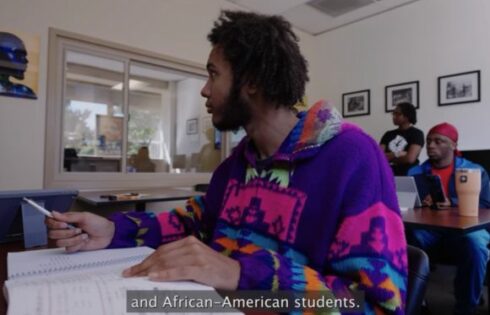Inside Higher Ed snagged an interview with the educator who developed the now-infamous “Stomp on Jesus” classroom exercise, which has drawn the ire of a nation onto Florida Atlantic University.
The educator, Jim Neuliep, told the newsite it’s all been one big misunderstanding. Yeah, the assignment calls for stepping on the word JESUS – but it’s the intent of the exercise that matters, he claims.
The drama started after a Florida professor and high-ranking member of the Palm Beach County Democratic Party recently instructed his students to take out a piece of paper, write “JESUS” on it, then put it on the floor and stomp on it – and the Mormon student who refused to do so, calling the assignment morally offensive – was suspended.
“Anytime you stomp on something it shows that you believe that something has no value. So if you were to stomp on the word Jesus, it says that the word has no value,” the Florida Atlantic University student in question, Ryan Roleta, told a CBS news affiliate.
After the news broke about the incident, campus officials were quick to point out the exercise came from the textbook: “Intercultural Communication: A Contextual Approach, 5th Edition.”
Inside Higher Ed reports:
Here is the text in which the instructor’s guide describes the exercise:
“This exercise is a bit sensitive, but really drives home the point that even though symbols are arbitrary, they take on very strong and emotional meanings. Have the students write the name JESUS in big letters on a piece of paper. Ask the students to stand up and put the paper on the floor in front of them with the name facing up. Ask the students to think about it for a moment. After a brief period of silence, instruct them to step on the paper. Most will hesitate. Ask why they can’t step on the paper. Discuss the importance of symbols in culture.”
Neuliep noted a few points in the exercise that he said were important. First, he noted that he used the word “step,” not “stomp.” Most important, he said, is that the exercise is done with the expectation that most students won’t step on the paper. And Neuliep said he has used the exercise in his own class, that hardly anyone steps on the paper, and that this is in fact the point.
One of the “most distinguishing features” of humans (compared to other animals) is the way they view symbols, some of which are quite powerful, he said. That’s the message of the exercise. When the students hesitate to step on the word “Jesus,” they understand that a piece of paper has meaning to them because of the word, which helps them understand the force of symbols, he added.
At St. Norbert, Neuliep said he has been doing the exercise for 30 years — without any complaints. He said that the discussion that follows tends to involve students “talking about how important Jesus is to them, and they defend why they won’t step on it. It reaffirms their faith.” And at the same time, he said, they learn about symbols.
Neuliep noted that a common question that has come up in commentary about the exercise — such as in this Fox News article — is why the exercise doesn’t call for students to write “Mohammed” on a piece of paper and to step on that. Neuliep said that the exercise was designed for us in the United States, where a majority of students wouldn’t have the reaction to “Mohammed” that they do to “Jesus.” If teaching the course in another country, he said, he might make the point with a different word, but for the exercise to work, the word needs to have real meaning to most students.
“If I asked them to write my name on the paper, they would step on it,” he said.
Neuliep said he has been stunned by how the exercise has been described and criticized in Florida. “I don’t know what happened at FAU, so I really can’t talk about that. Do I think the exercise has been misrepresented? Yes. Do I think the intent of the exercise has been misrepresented? Yes. The press accounts have inaccurately portrayed it as an attempt to stomp on Jesus.”
Click here to read more.
CLICK HERE to Like The College Fix on Facebook.




Please join the conversation about our stories on Facebook, Twitter, Instagram, Reddit, MeWe, Rumble, Gab, Minds and Gettr.